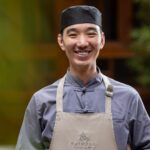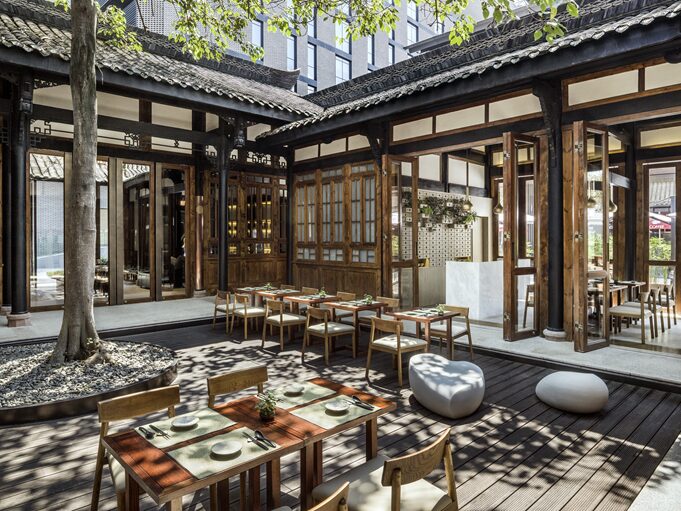Spending an afternoon in Mi Xun Teahouse, a tranquil restaurant near the Daci Temple in Chengdu’s downtown Taikoo Li shopping district, is a pleasure for each of the senses. The courtyard’s minimalist design, with its elegant wood and calming colour palette, is at once contemporary and rooted in a sense of place and tradition. Natural light casts dappled patterns on the polished stone floor. The air, rich with the perfume of Chinese tea and simmering broths, sets a laid-back pace – a hallmark of Chengdu – for enjoying good company and good food. Here at The Temple House’s exclusively plant-based restaurant, Chef Steven leads a culinary movement with sincerity, openness, and a warm sense of humour.
Like all great chefs, Chef Steven demonstrates a profound respect for his ingredients. For him, a pursuit of simplicity is the truest way to honour the flavour of each component. Explaining the distinctive character of Sichuan food, he quotes the local maxim ‘yi cai yi ge, bai cai bai wei’ – each dish has its own style, a hundred dishes have a hundred different flavours. This philosophy is the guiding principle for his vegetarian cuisine, cooked in his open kitchen with a sense of curiosity and purpose, support for local farmers, and an appreciation for the beauty of every season.
This approach led Mi Xun Teahouse to achieve a significant milestone this year: the first Green Michelin Star in Chengdu. When asked about the recognition, Chef Steven confesses with characteristic humility that he and his team were ‘quite surprised.’ Although this was quickly replaced by a sense of validation: ‘We’ve been doing things this way for ten years,’ he explains. ‘We feel like what we have always done has been seen.’

Sustainability: a marathon, not a sprint
Already retaining a Michelin star since 2021, Mi Xun Teahouse’s low-key luxury is characteristic of Sichuan’s capital, an easygoing haven for foodies and travellers seeking immersive experiences. Designated by UNESCO as a City of Gastronomy, Chengdu feels rich in culture while being modern and relaxed. Chef Steven’s revelatory, plant-based reimagining of Chinese classics speaks to this interplay. With calm focus, he views his team’s commitment to sustainability as a marathon, and one that comes with its challenges.
The first pillar of Chef Steven’s practice is his unwavering pursuit of local ingredients, which he believes is ‘the most direct and powerful’ way to reduce carbon footprint and support the local community. Over 90% of his vegetables come from eco-farms near Chengdu. His menu is a dynamic reflection of the seasons. Spring brings fresh bamboo shoots, summer features wild mushrooms, autumn highlights taro and lotus roots, and winter showcases the hearty flavours of radish. This dynamic approach ensures ingredients are always at their peak and reduces the need for long-distance transport.
The second pillar is a dedication to zero-waste practices, presenting a challenge that is a testament to the chef’s creativity with ingredients. His team is trained to use every part of a vegetable. Mushroom trimmings become a flavourful base for soup, while other leftover vegetable parts are repurposed for cold dishes or stock. This meticulous process ensures nothing goes to waste and every ingredient’s story is fully told. ‘We want to really show respect for nature,’ Chef Steven says, ‘the entire team really understands the kitchen’s zero-waste philosophy and makes it their daily practice.’

Honouring heritage with a contemporary vision
Chef Steven’s dishes balance his reverence for tradition with fresh ideas and bold innovation. He rethinks classic Sichuan dishes in a sustainable, plant-based light, such as the famous Mapo Tofu, a dish traditionally made with minced pork, here transformed into a vegetarian masterpiece using wild mushrooms. The story behind this dish began in 2017, when he tasted deep-fried wild mushrooms on his travels and was so inspired by the way the flavour infused the frying oil that he returned to his kitchen determined to replicate the experience. He now uses a soft tofu to better absorb the deep, umami flavour of the fried mushrooms, in a dish that has become one of his signatures.
Another menu highlight is Chef Steven’s interpretation of Dan Dan Noodles, a popular Chengdu street food elevated to fine dining by making the noodles from scratch with spinach juice that gives them a vibrant green hue. A nod to his innovative spirit, he uses a pasta-making technique, foregoing the traditional egg. The dish is served with two sauces on the side – a peanut and sesame sauce and a chilli oil with mushroom soup, an interactive presentation allowing diners to customise their experience.

Beyond the kitchen: community and purpose
Chef Steven’s philosophy extends outside of the Teahouse. The team’s collaboration with the World Wide Fund for Nature (WWF) to promote International Panda Day led them to source ingredients from farms near wild panda habitats. A true farm-to-table system, Chef Steven first designs the menu and then works with the farmers to plant the necessary ingredients, ensuring only what is needed is grown.
Chef Steven enjoys sharing his sustainability innovations with other restaurants. This spirit of knowledge-sharing is a refreshing practice in the culinary world, speaking to a collective goal of promoting more intentional sourcing and cooking practices across the industry. He admits that one of his biggest challenges is convincing people that his approach, far from being a ‘gimmick’, comes from a genuine desire to protect the natural world.
When asked about dream dinner guests, Chef Steven’s answers are as thoughtful as his dishes. He would invite Chef Lan Guijun, the renowned Sichuan cuisine master who first inspired him, to discuss how the culinary tradition can evolve respectfully with vegetarian cooking. Perhaps most endearingly, he would invite the farmers who supply his ingredients, wishing for them to experience how the fruits of their labour – their ‘ordinary Ya’an radishes’ or ‘eco-friendly potatoes’ – are transformed into a dish they never imagined. A beautiful sentiment that celebrates the journey from farm to table.
After a long day in the Mi Xun kitchen, Chef Steven says it is a privilege to return home and cook for this family, who are his biggest fans. His nine-year-old daughter – a budding chef herself – enjoys cooking alongside him, and has already mastered dishes such as scrambled eggs with tomato.
Chef Steven’s story tells of a deep-seated passion for food and a desire to create a more mindful and connected dining experience. It’s a reminder that exceptional cuisine can also be a force for good, and that sometimes, the secret ingredient is a little bit of purpose.
Experience Chef Steven’s plant-based creations with a visit to The Temple House


